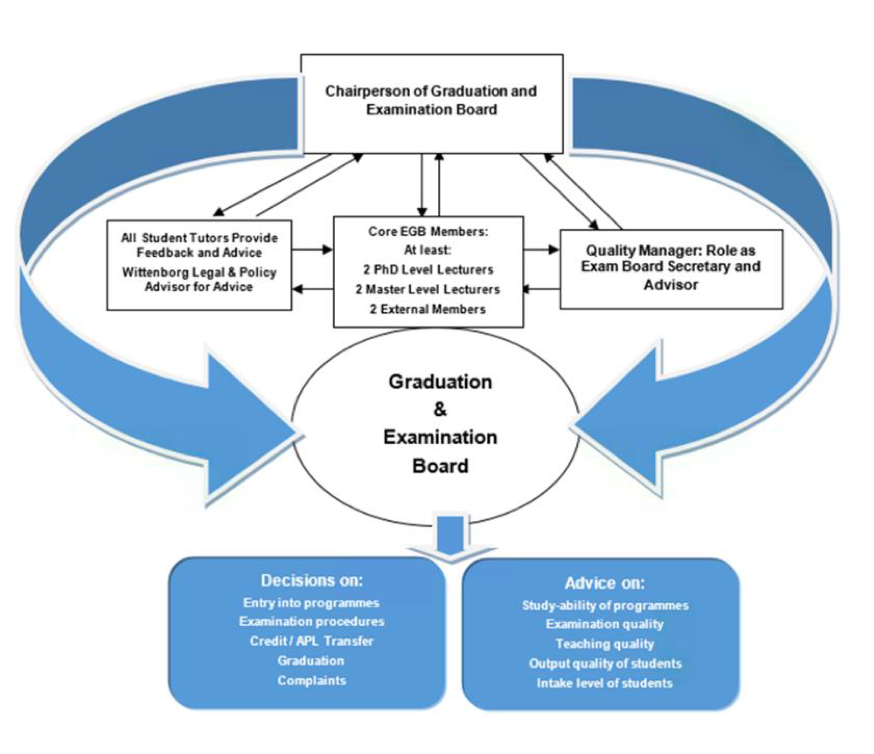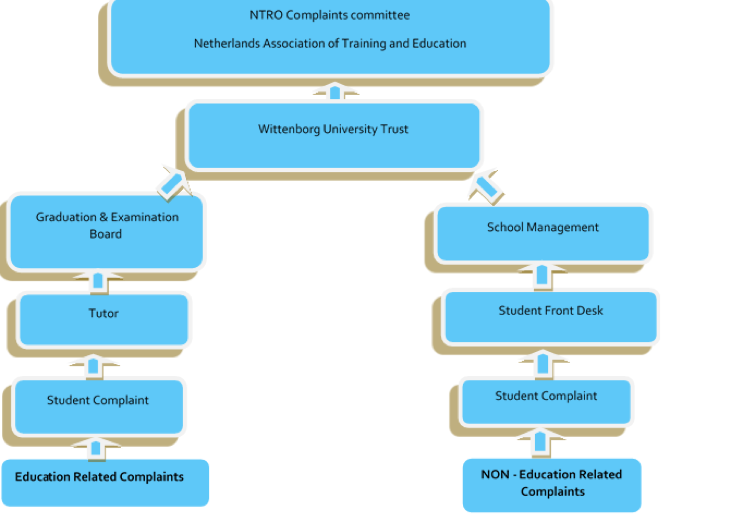As a compact institute, Wittenborg has one central Graduation and Examination Board (Exam Board), which ensures that all decisions regarding European Credit allocation and the awarding of degrees are brought under the responsibility of a relatively impartial body. (Relative, in the sense that although most members are employed by the institute, there are two “external members”, and no-one who has a legal or financial stake holding in the organisation is a member.
The Wittenborg Executive publishes Graduation & Examination Board Regulations for its programmes, (now part of an Education and Examination Guide). The Exam Board, as a key institutional body, ensures correct application of these, under Dutch Law and under agreements as part of external validations and accreditations, such as with the University of Brighton.
The Exam Board is comprised of Wittenborg teachers tutors and staff members, who are either fully employed or external consultants who teach Wittenborg modules, as well as 2 external members who work at other Dutch HEIs. The Chairperson of the Graduation & Examination Board is appointed by the Executive. In order to comply with Dutch Law, the Graduation & Examination Board, in effect, appoints all examiners, on the basis of employment and contract arrangements with the Executive.

Graduation & Examination Board Responsibilities

The Graduation & Examination Board is planned to meet 6 times a year, and can convene more often if required.
The Exam Board is responsible for ensuring that all students entering the programme have the correct qualifications and entry levels as set by the executive. To determine these, it can enlist the expertise of internal or external experts in diploma/degree verification, such as Nuffic (the institute that oversees and promotes international education in the Netherlands in a similar way to the UK’s British Council, or Germany’s DAAD).
The responsibilities and expertise of the Graduation & Examination Board are fully explained in its yearly report. The Exam Board also plays a role in the Wittenborg Complaints Procedure described in the Education and Examination Guides of Wittenborg’s programmes.
Graduation & Examination Board Responsibilities
- To monitor the quality of examinations in respect of whether they meet the programme objectives, required competences as outlined in the relevant module guide and the educational standards and philosophy of Wittenborg, as described in the EEG.
- To ensure examinations and evaluation leading to European Credits (study credits) are carried out in accordance with the Education and Examination Guide (EEG).
- To evaluate attendance and participation in relation to assessment, plus rules and regulation as proscribed by the relevant authorities in the Netherlands.
- To ensure that in all examinations, assessments, work placements and projects the papers and instructions have a level of English that is clear, jargon free and understandable.
- To oversee the testing and assessment processes and the quality of testing and assessment in line with the aims and objectives (Final Qualifications) of the programmes.
- To confirm the grades and evaluation of all examinations, projects, work placement, assessments and the final-year graduation dissertation and for all years and subjects in Wittenborg programmes.
- To adjudicate on infringement or irregularities in relation to the Education and Examination Guide, decide the appropriate changes and or sanctions and rule on appeals from students in respect of their examinations, assessments and work placement grades or any other aspects of the examination procedure, in line with the complaints procedure.
- To confirm that all graduation students have met the entire necessary requirement enabling the given student to receive their degree.
- To confirm decisions in respect of advanced placement, request for placement, credit transfers and internal promotion of and from students; furthermore, assessing and adjudication on the authenticity of educational certificates, degrees and diplomas.
- To evaluate the examination process as regards the principles of quality assurance ensuring continuous improvement and innovation in respect of all the various forms of assessment.
The Wittenborg Executive publishes a Graduation & Examination Board Regulations for its programmes (Part 6 of the Education and Examination Guide). The Exam Board, as a key institutional body, ensures correct application of these, under Dutch Law and under agreements as part of external validations and accreditations, such as with the University of Brighton. Currently, the Exam Board comprises of Wittenborg teachers, tutors and staff members, who are either fully employed or external consultants who teach Wittenborg modules, as well as 2 external members who work at other Dutch HEIs.
The Exam Board’s role in complaints procedure:
It is intended that the board meet at least once every education block (6 times a year). More frequent meetings can be held on request, and in the dealing of complaints. Wittenborg’s complaints procedure is described in the following diagram:
